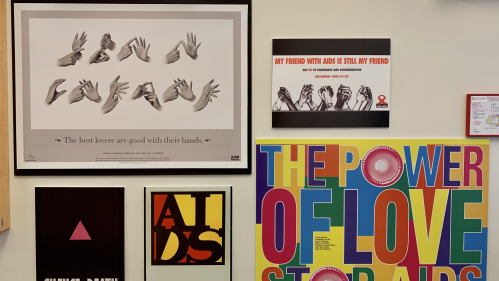
The Rutgers School of Public Health has launched a 100% online Master of Public Health (MPH) degree in Sexual and Reproductive Health, Rights and Justice, and is accepting students for the Fall 2026 semester.
Rutgers School of Public Health Launches HIV/AIDS Epidemic Art Exhibit

The Rutgers School of Public Health unveiled its HIV/AIDS Epidemic Art Exhibit at its Piscataway location this February.
The exhibit, which commemorates early public health initiatives confronting the HIV/AIDS epidemic, sourced art from the Wellcome Collection. The display seeks to offer insight and pay tribute to the efforts of pioneering activists, researchers, and leaders who courageously fought against the effects of HIV/AIDS, laying the foundation for our ongoing endeavors.
The exhibit is open to Rutgers School of Public Health students, faculty, and staff.
HIV/AIDS first came into the public eye in 1981 when the U.S. Centers for Disease Control and Prevention published findings in the Morbidity and Mortality Weekly Report (MMWR) describing cases of Pneumocystis carinii pneumonia in five previously healthy young men in Los Angeles. One month later, MMWR reported cases of Kaposi sarcoma in men in Los Angeles and New York, leading to the evolution of the term “gay plague.”
Soon thereafter, the disease began to emerge in other populations - including in women, newborns, and injection drug users - in major epicenters like Newark. In 1982, the disease began to be known as Acquired Immune Deficiency Syndrome (AIDS). Knowledge was slow to emerge, but by 1983, the virus that causes AIDS was identified and named Human Immunodeficiency Virus (HIV).
Efforts to understand, destigmatize, prevent, and treat HIV/AIDS over the course of the last four decades have led to many advances; however, to date, HIV/AIDS has claimed the lives of nearly 40 million people worldwide, with approximately 1 million people dying from AIDS-related complications each year.
“HIV/AIDS - like many other epidemics - disproportionately impacts and overburdens marginalized groups like people of color, sexual and gender minorities, immigrants, older adults, and other populations because of social and structural factors,” says Rutgers School of Public Health Dean Perry N. Halkitis. “This exhibit allows us to explore the intersection of art and public health through vintage posters that were and are symbols of activism and education.”
Additional art exhibits will be launched at both school’s locations throughout 2024.